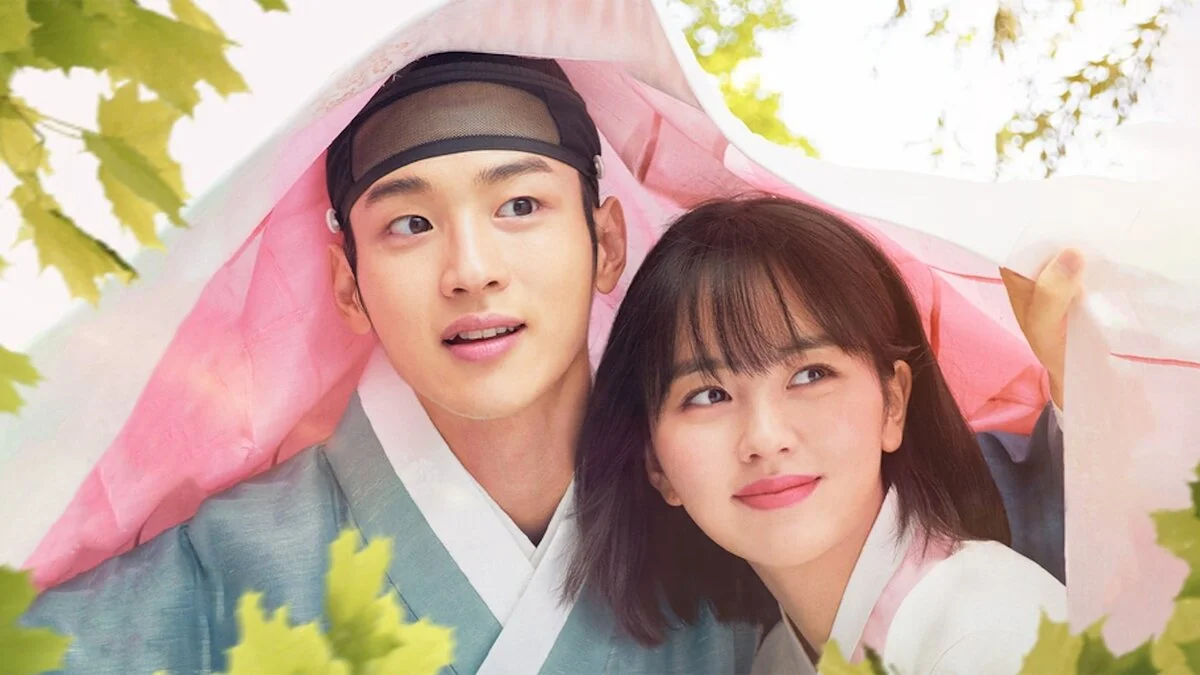
The Tale of Nokdu/from open access
Originally a Japanese term for television drama series, ‘dorama’ has now become synonymous with South Korean TV series. These shows represent an integral part of the Korean wave, which has been increasingly shaping global culture since the 1990s. Everyone remembers Squid Game, but that was just the tip of the cinematic iceberg that has been sailing in the oceans of the world in recent years. Film critic Alexey Vasilyev delves into the phenomenon of Korean doramas exclusively for Qalam.
This is the second part of our story about Korean TV series. The first part can be read here.
- 1. School 2013 (Hak-gyo 2013, 2013)
- 2. The Heirs (Wang-gwaneul Sseuryeoneun Ja, Geu Mugereul Gyeondyeora – Sangsokjadeul, 2013)
- 3. Reply 1988 / Eungdaphara 1988, 2016
- 4. Weightlifting Fairy / Yeokdoyojeong Gimbokju, 2017
- 5. The Legend of the Blue Sea / Pureun Badaui Jeonseol
- 6. Break Through! / Ssam Maiwei
- 7. I Am Not a Robot / Robosi Aniya
- 8. Trans-Siberian Pathfinders / Siberia Seonbaldae
- 9. True Beauty / Yeosin-gangnim
- 10. "Dal-li and Gamjatang" / Dalliwa Gamjatang
Boys Over Flowers (Kkotpoda Namja), a 2009 dorama, introduced the Western world to a new aspect of contemporary Korean culture. Unlike Winter Sonata (2002), which directly triggered the Korean Wave in Japan, Boys Over Flowers had a more indirect influence on the spread of Korean doramas across the world. Today, it's common for countries to have TV channels dedicated exclusively to Korean doramas.
Boys Over Flowers is a rare case where the series title is also the most accurate review. It describes what unfolds over twenty-five episodes with scalpel-like precision. The show, based on a Japanese manga, highlighted the creators' boldness in deciding not to adapt the world of the manga to screen but instead simply transform the young actors into precisely what the Japanese artist Yoko Kamio drew.
The story centers around four high school seniors, heirs of chaebols,1
All the boys were transformed into the images Kamio had drawn. Their lips were painted in such a way that made this clear. This wasn't professional makeup typically applied to actors, but rather lipstick on a schoolboy's lips. Their hair was dyed in radical new colors. They sported hairstyles that wouldn't even be displayed in barbershop windows in the 1970s. For instance, Min-ho's head featured curls that one character aptly compared to seashells. Another had honey-colored strands framing his face like a bellflower bud. This ‘bellflower’ rode around on a motorcycle wearing a helmet painted to resemble blue jeans cinched with a brown leather belt. It was bad enough that the bellflower’s white shirt was paired with a pale lavender tie (a shade more suited to blondes), but all this was then stuffed into a pale lavender suede jacket with a white collar, looking like pink silk and polka-dot patterns being scattered like confetti from a fire hydrant.
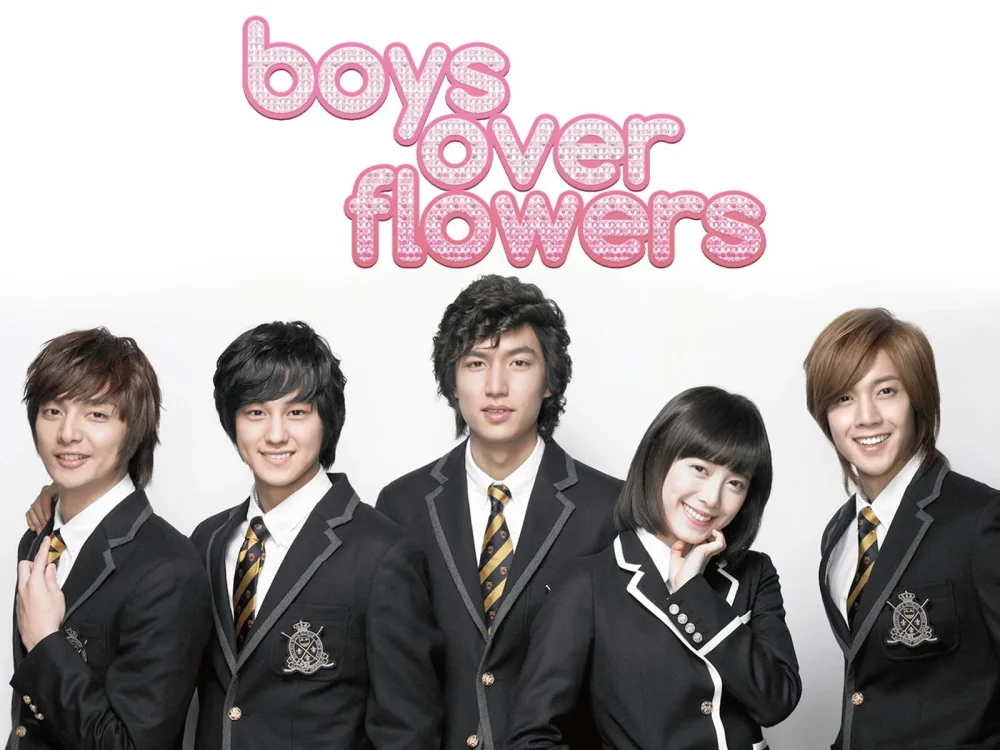
Boys over flowers TV Series' poster/from open access
Similarly, their boyish games—hockey, racing—were juxtaposed with scenes of tea parties, where cakes, cookies, and tartlets served at the table attracted almost as much attention from the camera as their boyish smiles. Tea was served by five maids who, according to manga conventions, wore outfits typical of the genre. They looked like European maids from the turn of the nineteenth to twentieth centuries, wearing black dresses with bell-shaped skirts, fine mercerized cotton stockings, pristine white lace aprons, and caps.
At times, this became hilariously absurd, and the viewers—schoolgirls savvy enough not to be fooled—laughed not at the creators, but with them, at their own silly, unrealistic girlish dreams. But then, typical of doramas, there would be a moment of piercing sincerity accompanied by a desperate gesture of friendship. When the leader of the group, pressured by blackmail from his mother or the sting of jealousy, was ready to abandon his laundress, his three musketeers concocted a scheme. In this plot, the bellflower, who was quite comfortable with the girl in question, deliberately took a hockey stick to the eye from the leader. This seemingly silly act was actually a noble sacrifice to ensure that his dear friend wouldn't lose something crucial to his happiness. It wouldn’t be surprising if cultural experts eventually agreed that the success of this dorama was a catalyst for the era of post-irony.
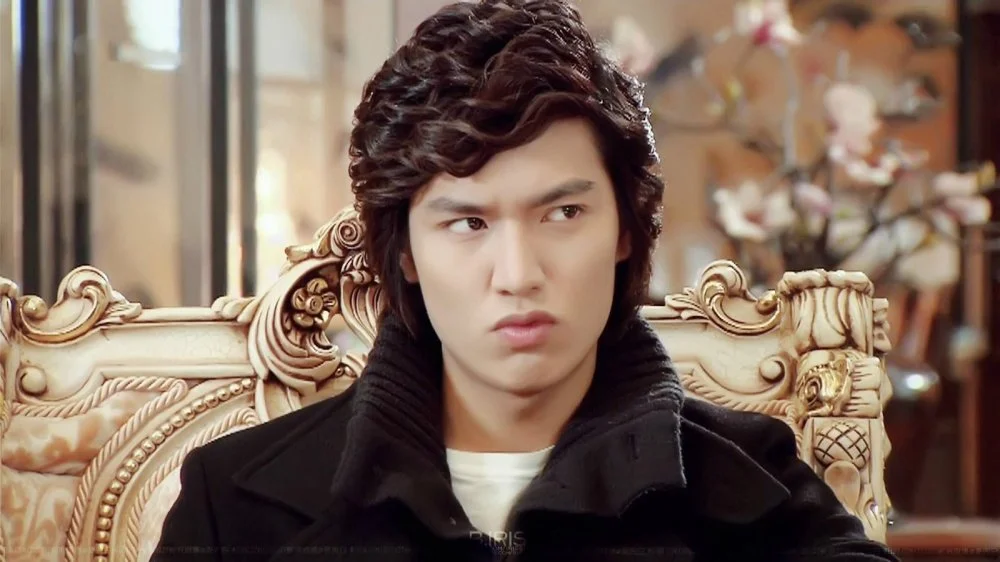
Boys over flowers TV Series/from open access
Another significant aspect of this dorama are the scenes where the boys overtly tease the heroine and, by extension, the audience in a sexual manner. Such explicitness was unprecedented in these shows but has since become the norm. The fifth episode, set on the group leader's private island in New Caledonia, culminates with him leading the laundress to the beach. To her immense surprise, being unaccustomed to the wealth and lifestyle of her suitor, a beautifully set table for two has been prepared. Then, standing and striking a pose reminiscent of the lead singer of a boy band, his legs wide apart and torso slightly tilted back and to the left, he declares, ‘If you're done admiring the table, let's get down to business.’ He then unbuttons and tears off his shirt, revealing an unusually muscular torso for a boy. At this moment, the screen freezes, leaving the audience hanging until the next episode airs the next day.
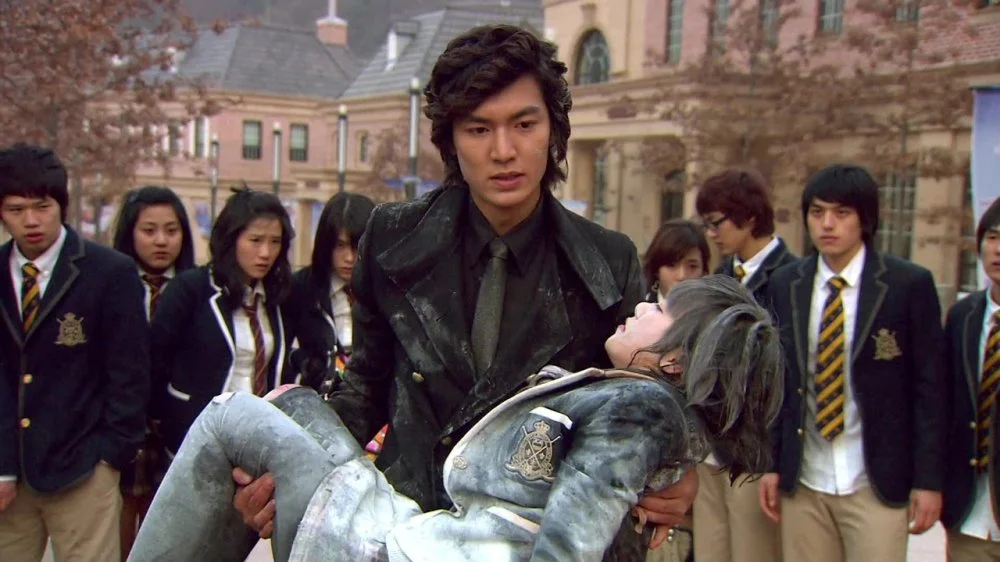
Boys over flowers TY series/from open access
Across Southeast Asia, already captivated by doramas, Boys Over Flowers exploded in popularity like flames across an oil-soaked sea—its success was unprecedented. So what exactly did they offer? For one, smooth-skinned schoolboys. Due to various genetic factors, Koreans have almost no body hair, and growing a mustache is a complex and often futile endeavor. Additionally, they possessed pleasant, resonant male voices with demanding, fiery intonation and distinctly well-muscled torsos. Lee Min-ho was amongst the first actors to develop and maintain a good physical tone. Many have since surpassed him, both in terms of spectacle, like Kim Woo-bin, and uniqueness, like Kim Min-jae, the archetypal bad boy with an angelic face. They wore outfits that carelessly mixed masculine and feminine motifs and sported hair of every conceivable color.
If you've been following recent treds, you might have realized that the imagery of Boys Over Flowers contributed to the rise of the boy band BTS. They became the first non-American group since the Beatles to top the Billboard charts, and their American stadium shows sell out within twenty minutes of going on sale. When BTS took America by storm in 2017–18, fans wanted to know everything about them. Asian girls who already followed the group shared information with their Western counterparts on social media. These discussions also brought to attention photos of other Korean celebrities and idols. As mentioned in the previous article, a Korean idol is rarely isolated within a single sphere of show business.
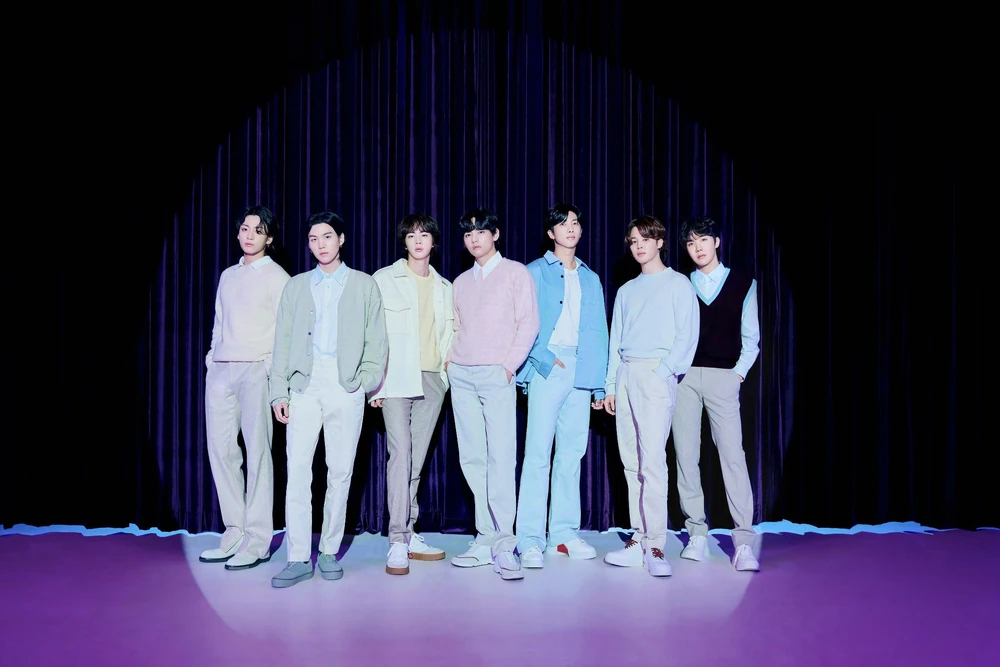
BTS/from open access
Thus, through social media, the internet, and YouTube, the popularity of the dorama began to spread in the West. The most astute programming directors at television channels, always on the lookout for new and exciting content, were quick to offer them airtime. This move paid off at once: schoolgirls, grown women, and young boys alike became fans immediately. For the dorama, the pandemic, bringing with it prolonged lockdowns, struck at just the right moment. It was the perfect circumstance in which to binge-watch these multi-episode series all day without any guilt. After all, you were only following government directives to stay indoors. When the lockdowns lifted, and we rubbed our eyes, we found ourselves barely remembering what Tom Cruise looked like, unable to name films starring Brad Pitt off the top of our heads. But if we were woken in the middle of the night, we could unerringly point out where and under what circumstances we saw Kim Woo-bin's size 46 shoes (the correct answer is in School 2013 (Hak-gyo 2013, 2013) of course!).

School 2013 TV poster/from open access
Actors in doramas generally have a broad and sometimes unpredictable range. While each role may have specific characteristics associated with the actor's on-screen persona, they showcase a wide range of abilities across different dramas. For instance, if viewers associated Lee Min-ho with the oceanic sunsets of New Caledonia and the quaint canals of Macau in Boys Over Flowers, then they see him encounter his love while holding a surfboard on a Californian beach in The Heirs (Sangsokjadeul, 2013). In The Legend of the Blue Sea (Pureun Badaui Jeonseol, 2017), they see his character encounter a modern-day mermaid who first steps onto Spanish soil before him. If Nam Joo Hyuk played the leader of a school swimming team in Who Are You: School 2015 (Huayu: Hakgyo 2015, 2015) then an Olympic junior swimming medal becomes a focal point for his character in Weightlifting Fairy Kim Bok-joo (Yeojdoyojeong Gimbokju, 2017).
The roles themselves, their portrayal, demeanor, and responses can vary dramatically. There are no two school bullies more different than those portrayed by Kim Woo Bin in a single year (2013), in School 2013 and The Heirs, owing to the differences in motivations and destinies outlined in the scripts. In School 2013, he partners with Lee Jong-suk, a beloved friend and mentor who taught him a great deal about acting as they portrayed a sorrowful duo in the series. Lee Jong-suk is one of the rare actors capable of constructing a role with unexpected twists and carefully concealed but clues noticeable to the observant eye, much like a detective. He understands the genre and activates this ‘detective mode’ when necessary. For example, in Pinocchio (Pinokio, 2015), where, beneath his disguise as a scruffy country buffoon bicycling around his green-blue island with a child's pinwheel hides a well-read young man whose erudition will help him win a national quiz show, such a mode is essential. However, Jong-suk discarded it in the role of a comic book hero in W—Two Worlds (Deobeoryu, 2016). This sixteen-episode series originated from a music video for the song ‘Take On Me’ (1985) by the group a-ha, where a girl enamored with comics is pulled into the black-and-white graphic adventures by the comic’s hero (and lead vocalist of the band) Morten Harket.
Recently, Jang Na Ra, known for her touchingly vulnerable roles, dyed her hair raven black and played a ghost hunter in the mystical detective series Sell Your Haunted House (Daebakbudongsan, 2021), adopting a completely different, assertive, and laid-back style. And even though she's dubbed the ‘Queen of Romance’, it’s important to remember that romance in doramas is quite unique. In one of her most genre-blending doramas, Fated to Love You (Unmyeongcheoreom Neol Saranghae, 2014), where comedy, tragedy, melodrama, and a workplace narrative seamlessly merge, her character’s first encounter with her future husband is quite unconventional. In the first epiode, they both mistakenly enter the same hotel room while extremely intoxicated, believing it's their own. The next morning, they wake up naked under the same blanket, and Na Ra’s character discovers she is pregnant from the incident.
In addition to a star system reminiscent of 1940s Hollywood, by the time of the COVID-19 lockdowns, doramas had developed impressive diversity in terms of material and genres. Although Boys Over Flowers started a trend of a specific school film archetype—a girl from a poor family is transferred to an elite school due to a twist of fate and becomes the center of attention for young tycoons (as seen in The Heirs, and True Beauty (Yeosin Gangnam, 2021)—dorama creators are too skilled, even conscientious artists, to simply repeat this formula. The peculiar charm of Boys Over Water remained unique. In subsequent series, their external appearance became much calmer and more masculine. At the same time, the focus shifted to emotional depth, where loneliness, pain, the associated inability to connect with peers, and an unacknowledged longing for human warmth were mixed and enhanced with unique ingredients each time. Additionally, many doramas feature characters of various ages, including middle-aged women, such as the 50-year-old divorced and widowed protagonists in Jealousy Incarnate (Jiltuui hwasin, 2016).
While romantic comedy and shows about contemporary everyday life are the main themes in which doramas fully exhibit their unique and original qualities, the range of genres within doramas is as broad as any developed television industry, like in the United States. One of the most popular genres is the historical costume drama set during the Joseon era (fifteenth to nineteenth centuries). Along with dramatized biographies of actual historical figures (such as Empress Ki (Gi Hwanghu, 2014), which was so successful it ran for fifty episodes), adaptations of the era's literary classics have been extensively adapted in both South and North Korea (Hong Gil-dong (Hong Gil-dong) 2008).
Additionally doramas also commonly explore genres such as folk depictions (Moonshine (Kkot Pimyeon Dal Saenggakago), 2022, which is about moonshiners during prohibition) and various forms of fantasy/mysticism.
An interesting and unique example is the successful adaptation of a vampire horror film into a historical costume drama, Scholar Who Walks the Night (Bameul Geotneun Seonbi, 2015). In this drama, the main heroine, who distributes pornographic comics, disguised herself as a boy, evoking tender, ambiguous reactions among the men in the show, reminiscent of Shakespeare's Twelfth Night. Conversely, The Tale of Nokdu (Joseolloko Nokdujeon, 2019) features a young man hiding in a village of widows, which hilariously causes quite a stir among the older men nearby. In the West, the enjoyment of such risqué situations was largely abandoned about forty years ago, around the time of Tootsie. By using such archaic themes, doramas boldly acknowledge both their own playful immaturity and the relative innocence of the society from which they originate, especially by contemporary Western standards.
Given this context, it's no surprise that modern fairy tales featuring all sorts of miracles are popular, especially those that assist Cinderellas win over princes. For instance, in Queen of the Ring (Banjiui Yeowang, 2017), a plain-looking woman only needs to wear a magic ring to make a notorious womanizer see her as the woman of his dreams. Similarly, it's amusing to see how the plus-sized heroine of Perfume (Peopyum, 2019) inflates and deflates in the most unsuitable places and situations, depending on whether she manages to spray herself with the magical perfume that transforms her into a top model. As typical of the best doramas, the laughter quickly turns to tears when her daughter, embarrassed by her mother and having treated her poorly, shows a friend a photo after her mother’s disappearance. The photo, taken from behind through a doorway, depicts a woman with disheveled hair in an oversized dress, the daughter says, ‘This is the only photo I have left of my mom.’
The theme of time travel films is also popular, and well-known shows include Two Boots – A Pair and Live Up to Your Name (Myeongbulheojeon, 2017), where the characters oscillate between present-day Seoul and the Joseon kingdom. Hospital series are also well-regarded. We discussed The Good Doctor (Gut Dukteo, 2013), which was remade in America, in the first article, and Emergency Couple (Eung-geumnamnyeo, 2014) is noteworthy as well, where young divorced spouses end up as interns in the same hospital after six years.
In addition to shows featuring ordinary miracles, the mystical genre is also gaining popularity. One notable success is Tale of the Nine-Tailed (Gumihodyeon, 2020), whose initial episodes are not only captivating but are so frightening that it becomes terrifying to sleep alone in the dark. The screenwriters' craftsmanship takes over as they bring the most iconic figures from both Korean and Japanese folklore—shape-shifting foxes—into the modern era. And it must be said that actor Lee Dong-wook’s torso should be displayed next to Michelangelo's David.
Hotel Del Luna (Hotel delluna, 2019) also enjoyed huge success. The show is about a purgatorial hotel where souls await their fate. Initially reminiscent of The Shining, we gradually learn about the relationships among the staff, their unfulfilled life plans, and the unspoken love that amusingly and touchingly influences their interactions, especially between two elderly people. Thanks to a remarkable ensemble cast and a unique atmosphere blending the ambience of a daytime bar and the whimsical flirtation of an operetta about people who squandered their happiness, the hotel that once terrified Jack Nicholson turns out to be much like the 13 Chairs Pub, a humorous Soviet TV show set in a supposedly Polish cafe.
An entirely different atmosphere, as piercing as a brutal winter day and as haunting as an ancient unsolved murder, permeates Jirisan (Jirisan, 2021). One of its main attractions is the performance by the true diva of doramas, the stately and beautiful Jun Ji-hyun. However, the twist lies in the fact that there is a genuine detective story hidden beneath the mystical thriller involving people dying on the mountain under mysterious circumstances. The finale unravels with a logical explanation for all the events.
The detective shows prevalent in Japanese doramas, such as The Locked Room (Kagi no Kakatta Heya, 2012) and Detective Galileo (Garireo, 2007), do not feature as prominently in the world of Korean dramas. These shows focus on a brilliant detective solving seemingly illogical and physically impossible murders in each episode. However, the most popular and mind-boggling Japanese series in terms of mysteries and their resolutions are animated ones like The Kindaichi Case Files (Kindaichi Shounen no Jikenbo (1997–2016)) and Detective Conan (Meitantei Conan, which has been running continuously since 1996. In Korea, such long-running shows are rare, and when they do appear, they typically involve a series of murders that lead to a single perpetrator by the end. Successful Korean detective dramas often rely on specific cultural elements such as local mythology, like in Jirisan, or a romantic comedy where characters drink heavily but are afraid to confess their love, like in Suspicious Partner (Susanghan Pateuneo, 2017) as these represents the fundamental, original genre of doramas.
Dorama fans can reel off the names of numerous masterpieces, spanning action-packed spy thrillers to fantasy and even war dramas. It’s important to understand that if a Korean product, regardless of the genre, is well-made—like Healer (Hilleo, 2015)—it is often indistinguishable from an American one in quality. However, opting to watch a Korean show over an American one makes sense only if you've already been drawn into the world of Korean stars and have formed attachments to some of them.

Healer (TV series)/from open access
To help you fully immerse yourself in the world of Korean doramas, we've curated a list of ten shows that offer experiences not found in any other film culture. Although not all of these shows were highly rated, they each explore the intricate dance of emotions and the journey to their most effective realization through everyday actions. These series are listed in the order in which they first aired on Korean television.
School 2013 (Hak-gyo 2013, 2013)
‘I lived aimlessly, knowing there was no future. And at some point, I just forgot—while I was playing with you.’ This dorama stands out as one of the best portrayals of friendship, and it is arguably the most profoundly moving show about friendship in the world. Shot in a raw Japanese home video style, which Korean television producers typically avoid, School 2013 narrates the poignant story of a friendship fractured by the naive actions of sixteen-year-olds and the challenges of mending it three years later. It features two boys, one is an orphan and the other is the son of an alcoholic. They share one pillow, or rather, a towel they use to wipe their feet after running through back alleys before bedtime. Lee Jong-suk and Kim Woo-bin appear in an authentic and unpolished manner for the first time: without studio lighting, without lipstick, without makeup, showing all their pores, their faces pale and buffeted by the dirty winter wind as they ride a motorcycle or run from gangsters. Their expressions are unguarded, displaying nasolabial folds that make them appear as raw and genuine as they will never be again. Makeup was technically impractical as well because the boys cry often, and it would have smeared. And there's much to cry about in this series as well. In one particularly harrowing scene, Jong-suk thinks he'll never see his friend again and asks him to share a meal with him. He proceeds to stuff his mouth to prevent his lips from trembling or his face from betraying his pain, capturing the excruciating precision of a person about to lose what he treasures most—indeed, as he admits, ‘The only thing I have is you, you jerk.’
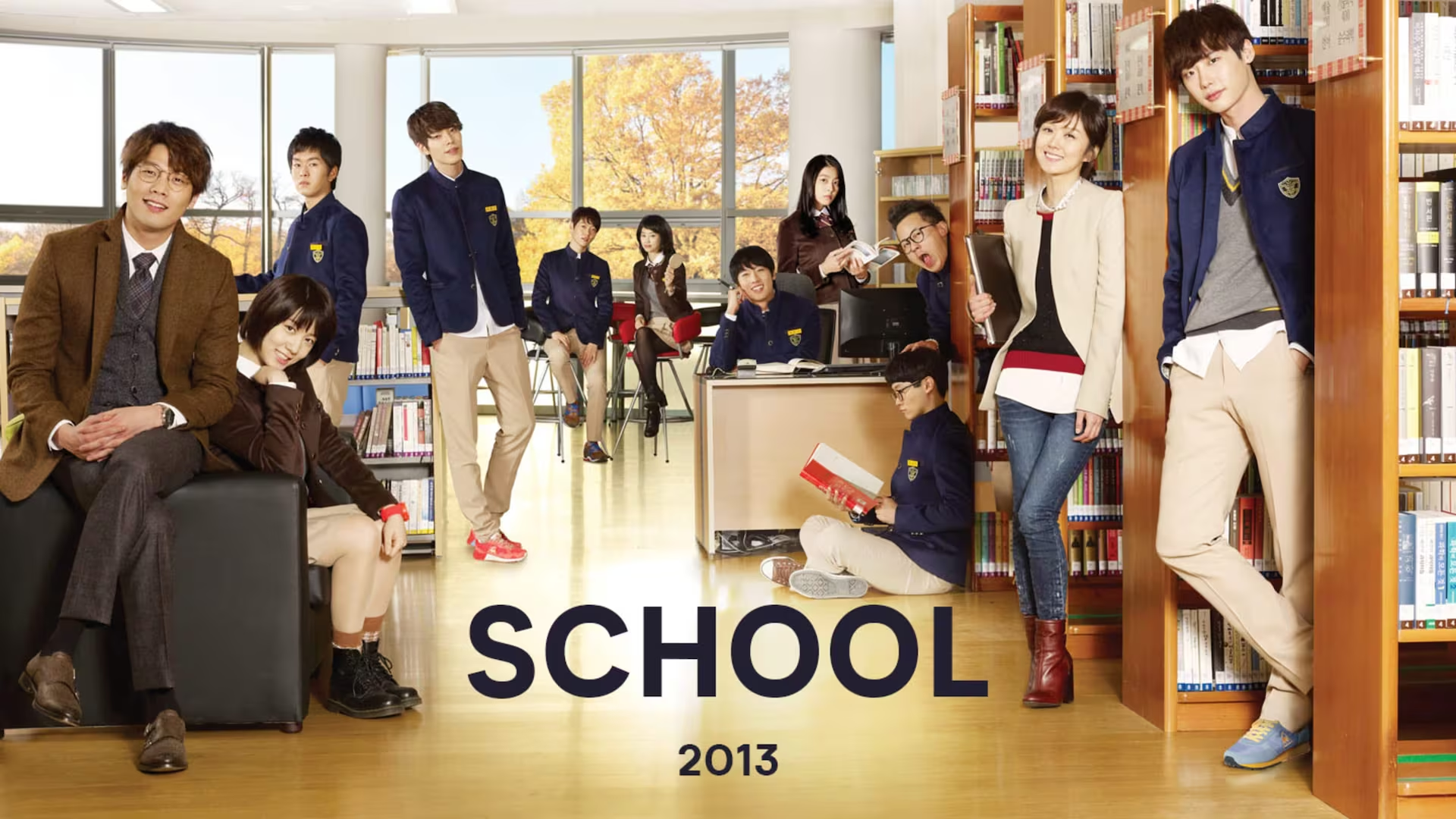
School 2013 (TV series)/from open access
The Heirs (Wang-gwaneul Sseuryeoneun Ja, Geu Mugereul Gyeondyeora – Sangsokjadeul, 2013)
In this show as well, we encounter a friendship damaged by careless youthful hands, with Kim Woo-bin returning in a classroom reunion three years later. However, this time the story unfolds in a complicated love triangle in the world of the chaebols. The directors delight in styling the domestic turmoil and clashes between the billionaires' wives and mistresses in the style of Brazilian telenovelas. Despite the elaborate setting, Kim Woo-bin remains the true asset of the series. Unlike his character in School 2013, the impoverished boywho hid behind his pride and vengeful behavior while desperately asking, ‘Did you even miss me, you jerk?’ Here, Woo Bin is like a shark. Sharks often ingest inedible objects thrown into the sea—like tin cans and plastic bottles—out of curiosity, using their jaws as their only means of exploring. Woo Bin's character uses aggression and harm as a way to connect. Towards the end, through his physicality and expressions alone, he reveals such profound loneliness in his character that it elevates him to the ranks of acting greats.
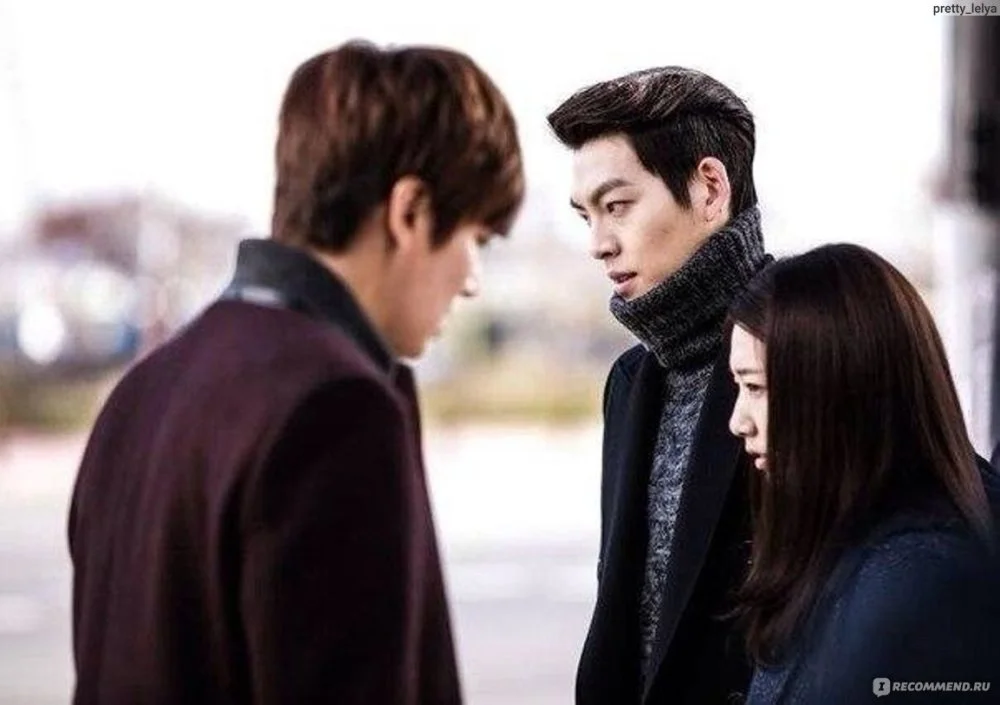
Inheritors (TV series)/from open access
Reply 1988 / Eungdaphara 1988, 2016
This world no longer exists, "where births were celebrated and funerals attended by the entire courtyard." The film transports us back to September 1988, "to this three-house street," more precisely, to five houses located in what used to be dead ends where skyscrapers now stand. The residents weren't exactly poor; they were families of office workers. At this time, Korea had just held its first democratic elections, Seoul was preparing to host the Olympics, and the standard of living was not what it is today. Housewives sifted through peas and gossiped about husbands and children, student demonstrations were still being violently suppressed, and instead of doramas, which had not yet reached the level we recognize today, they watched Hong Kong films. One of the schoolgirls, attended by local children, was nicknamed Maggie Cheung, and the series itself begins with a scene where five schoolchildren watch John Woo's action film "A Better Tomorrow II" on video. They get drunk on Chinese liquor and sleep sprawled out together in heaps. Their liquor supplier is Taek, their international Go champion, who travels the world and can afford anything he wants, but his face lights up with a joyful smile only when he sees this street and these people among whom he grew up. This incredible smile not only earned actor Park Bo Gum the title of "national younger brother" but also, without a doubt, became a factor in the film's grand and global success, as did the nostalgia. The creators adopt a leisurely pace: the episodes are not the usual hour long but an hour and a half.
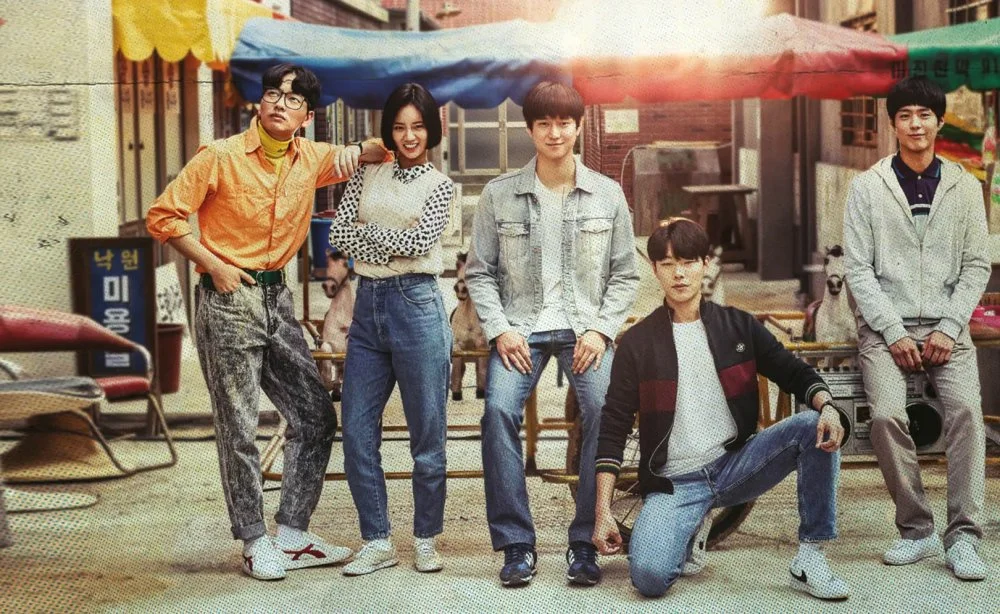
Reply 1988 (TV series)/from open access
Weightlifting Fairy / Yeokdoyojeong Gimbokju, 2017
Once, a disheartened first-grader, overwhelmed by school troubles, wished so fervently to avoid his peers that he failed to notice he was standing perilously on the edge of a third-floor windowsill. Below the window, a very chubby girl, who had just successfully stuffed an entire cake into her mouth and was busily chewing it while walking, passed by. The girl was so plump that when the first-grader finally fell from the windowsill and landed directly on her, he bounced off her belly and remained unharmed. Thirteen years later, he is an Olympic youth swimming team hopeful, and she is a weightlifting hopeful; predictably, their paths cross during sports school training for the Olympics. Naturally, the handsome young man is drawn to the girl who once saved him, though she (played by Lee Sung Kyung in her always eccentric manner, who padded her cheeks for the role and dressed in unflattering clothes) is not eager to befriend the boy who knocked her down in childhood and caused her to expel the eagerly chewed cake through her nose. However, she is fond of his brother: square-jawed Lee Jae Yoon, dressed here in a pink cashmere sweater, coat, and polka-dot umbrella, presents the softest side of his masculinity to the audience. The remarkable ensemble cast is rounded out by Ji Il Joo as the friend of the main character, whose interest in the quirky girl doesn't provoke jealousy—his nature is too friendly and good-natured for that—but does make him scratch his red head wondering what to do now with his lonely evenings in their room. The film perfectly matches the off-screen guitar song "From Now On" by Kim Min Syun, reminiscent of a jog under the gentle rays of the morning sun, which could easily serve as an alarm clock tune, just like this cheerful, yet far from senseless dorama.
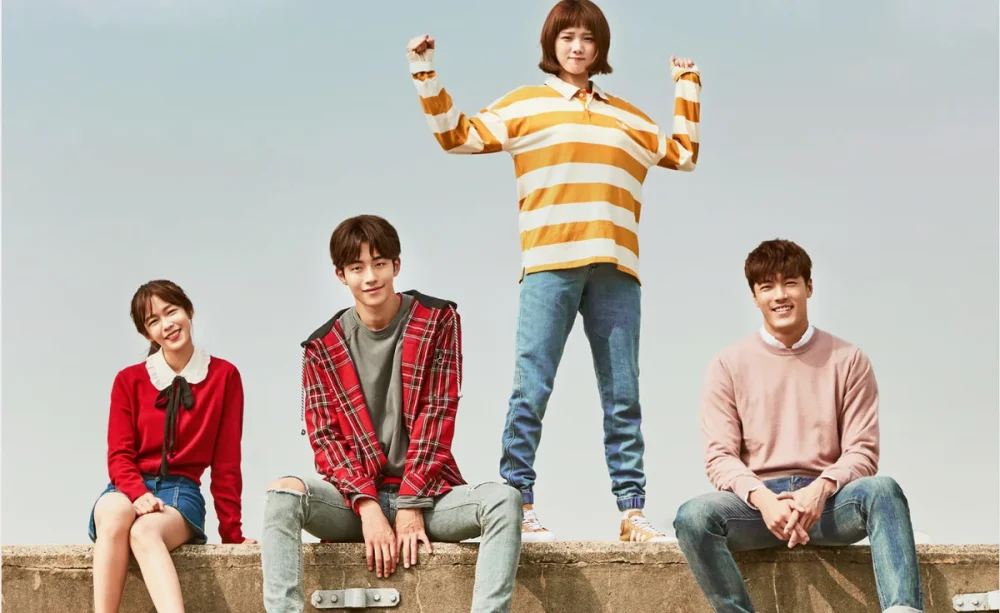
Weightlifting Fairy Kim Bok-joo/from open access
The Legend of the Blue Sea / Pureun Badaui Jeonseol
Among the stars of doramas, there are many attractive actresses. Some compensate for their plain looks with standout personalities, while others are unremarkable in every respect. However, there is only one true diva—Jun Ji Hyun. "Commander" is the apt description for her in terms of beauty, the sharpness and clarity of her role portrayal, and her work within the ensemble. In this series, she leads a team of elite comedic actresses, playing a modern mermaid who falls so deeply in love with a con man (Lee Min Ho) that she ventures into contemporary Seoul. Unlike Andersen's mermaid, she only interacts with fashion victims, dresses from the trash bins of Gangnam—a district of the nouveau riche who discard designer clothes after a single use—mixing colorful and diverse styles according to her mermaid tastes, bewildering women who spend their leisure flipping through Vogue: "How out of touch I am! I didn't know Chanel and Dior had collaborated!" The mermaid learns about human life from the doramas, leading to a cascade of comedic situations because she mimics the behavior seen in serials, where wicked women douse the good ones with water and give them money to steer clear of their sons. Ultimately, Ji Hyun portrays a girl with whom anyone would want to be friends—someone who effortlessly approaches an eight-year-old girl on the street, wraps an arm around her, glances around slyly while dancing a bit, and cheekily asks, "Got any change?" This, too, marks the beginning of a beautiful friendship.

Legend of the Blue Sea/from open access
Break Through! / Ssam Maiwei
This quintessential example of Korean-style pink neorealism, a comedy about being "poor but happy," features a guy and a girl living across from each other in apartments along a stairway alley. She dreams of being a radio host, an emcee, a newscaster—someone who works with a microphone—but she settles for announcing sales and lost items over a supermarket PA system. He was a taekwondo champion, but after his mandatory three-year military service—a requirement for all men in South Korea—he lost his sponsors and is contemplating taking part in underground fights. He treats her like one of the guys, playfully choking her when they bump into each other on the stairs before work. She also acts like one of the guys—except she opens the door with freshly painted eyebrows when the neighbor pops in for some salt. Their world is one of sweatpants and potted plants, hopes within reach yet frustratingly elusive, and a friendship constantly impeded by obstacles—that should have made them realize it was love. But what kind of love is possible when the landlady threatens to evict them for unpaid rent? This heartwarming duo is played by the warm and smiling Park Soo-joon (who, in the Oscar-winning 'Parasite,' played the English tutor who suggests his poor friend temporarily replace him in a wealthy household) and the incredibly versatile actress Kim Ji-won, who here bears a striking resemblance to the 1970s Japanese diva Komaki Kurihara. In 'The Heirs', she portrayed a stubborn and capricious chaebol heiress, allowing her eyes to convey the bitterness of realizing that the love and friendship so cherished by everyone around her were out of her reach.

Fight for My Way (TV series)/from open access
I Am Not a Robot / Robosi Aniya
You might fall in love with this film just because of its main character. Imagine a young man who reports to the military draft board and declares he’s unfit for military service due to a severe allergy to people. The military doctors laugh at him, but he insists they touch his palm—immediately, his skin breaks out in welts. Satisfied, he drives home in a luxury car to a three-story mansion, which is all his since his parents died many years ago, and he is the heir to a billion-dollar fortune. In his early twenties, he does not need to worry about relationships since people can't touch him. He also carries a meter-long stick to prod any inattentive workers or waiters, embodying every 20-year-old’s dream of a carefree life. The plot thickens when his company, which has been developing an android modeled after a girl the project leader once loved, encounters a malfunction just before the robot's unveiling. To prevent a disaster, the scientists persuade the girl to pretend to be the robot and visit the young man while they fix the actual machine. Initially amused, he soon realizes he can touch the "robot" without any allergic reactions... You can probably guess how the plot unfolds from there. The lead role is captivatingly portrayed by Yoo Seung-ho, who starred in "The Way Home" in 2002, a profoundly moving film about a spoiled city boy adapting to life with his mute rural grandmother.

I am not a Robot/from open access
Trans-Siberian Pathfinders / Siberia Seonbaldae
Originally planned as a reality show, this nine-episode series follows five male movie stars, aged 20 to 40, as they travel from Vladivostok to Moscow, making several stops along the way, always in third-class sleeper cars. While the genre remains consistent throughout, the film's magic lies in its evolution into something deeper and more meaningful. In the stifling, cramped sleeper car, news reaches them—one of the young men is romantically linked by Korean media to Chang Na Ra during his absence. Meanwhile, Lee Sun Gyun, known for his role as the affluent homeowner in "Parasite" (which was shown across screens in Russia and worldwide at the time), is recognized. He is asked for photos and engages in lengthy discussions about Korean cinema. This film demonstrates how life unfolds if allowed to be just that—a life, not merely a spectacle or a race.

Trans-Siberian Pathfinders/from open access
True Beauty / Yeosin-gangnim
This is another story about a shattered friendship, portrayed through the character of a girl bullied by her classmates. After being transferred to a new school, she vows to avoid repeating her past torment. Using skillful makeup, she transforms herself into a stunning beauty. In her class, there's a handsome boy who is a loner, lives by himself, and spends his evenings at the same comic book shop she visits—except she's there without makeup, blemishes, and glasses. Remarkably, he is the only one who recognizes from the start that the comic shop girl and the class beauty are the same person. A former friend , now a frenemy enters the scene, transforming the story into another unique narrative about repairing a fractured friendship. This film, although it seems to rehash mass culture clichés such as " "beauty isn't everything" and "don't sulk—there's always show business," contains a wealth of genuine tenderness that transcends societal norms. This is reminiscent of the scenes where the handsome protagonist must help his injured friend navigate the bathroom when they find themselves in the hospital. Maybe each of us requires nurturing like babies, devoid of any revulsion, by someone like our mothers—or a true best friend. Otherwise, why would this particular series become the most iconic show of the year in dozens of countries around the world?

True beauty TV series/from open access
"Dal-li and Gamjatang" / Dalliwa Gamjatang
"These paintings are enormous, vibrant, and stunning," declares a Japanese art historian at a reception hosted by a Dutch collector where she decides to showcase her newly acquired Modigliani. However, the Japanese guest is most intrigued by a painting of pigs created by the collector's grandmother. He explains to the distinguished gathering that the painting is instructive because it shows a pig with feces smeared across its hindquarters in a way that indicates the presence of proliferative enteritis, suggesting that the pig needs to be isolated. Of course, he isn't really an art historian but a Korean owner of a chain of restaurants specializing in pork soup, gamjatang, mistakenly brought there by Dal-li, a local gallery curator who confused him for someone else at the airport. From as young as 11, he could extort significant sums from traders at Majandong, Seoul's largest pork market, through the food he cooked and sold. He commands respect, often placing his hands on his hips and speaking authoritatively to those in his circle who only understand pork. When Dal-li mentions that Leonardo da Vinci wanted to open a restaurant named "The Three Frogs, Sandro and Leonardo," he confidently replies, "Certainly not in Korea, or I would have known about it; I am a board member of the Korean Restaurant Association." After a half dozen such exchanges, the sophisticated Dal-li is bursting with laughter, proclaiming, "You're more interesting than anyone I've ever known!" to which he laughs in return. Before then, he had never managed to amuse anyone. This tale of opposites attracting is played out to the tunes of the 1920s in a showy, feathered, and frilly setting, with an unconventional heroine: Dal-li from the art world. When Mr. Chin accidentally falls on her naked and becomes embarrassed by his erection, she just laughs while he, pleased by the unexpected effect, beats his chest, declaring, "I'm a stud! I’m Hot!" This atypical dorama comedy features a real acting ballet from former rapper Kim Min Jae.
Read the first part of our story about Korean TV series here.
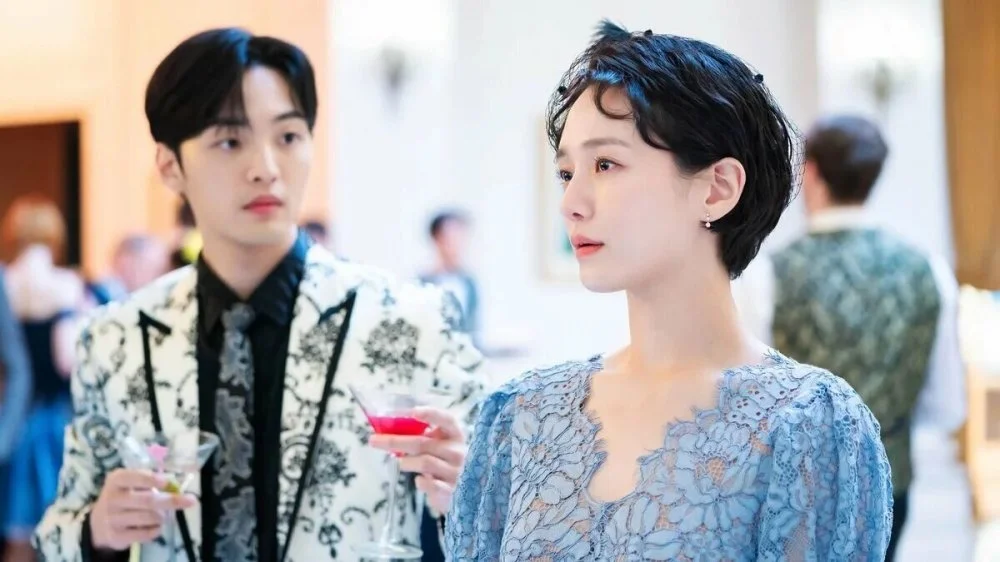
Dali & Cocky Prince (TV series)/from open access